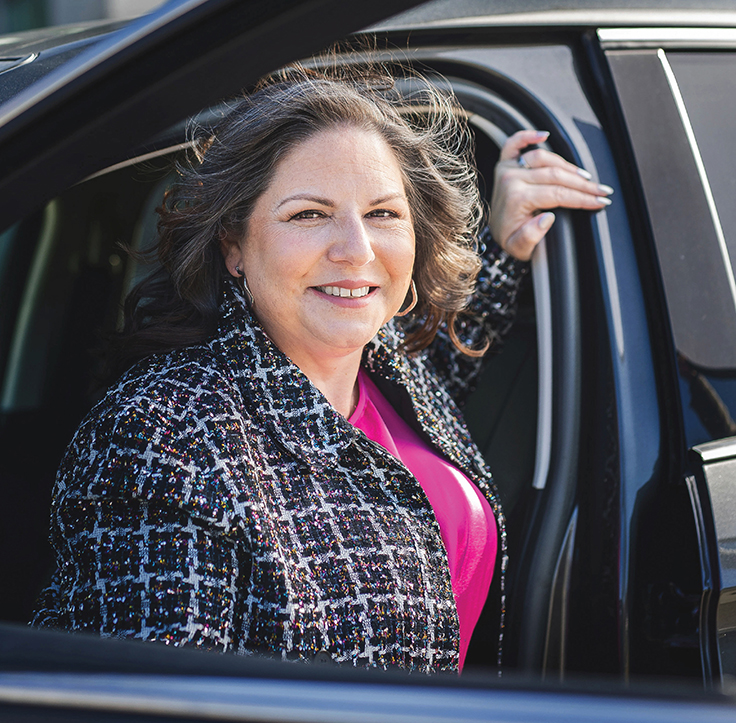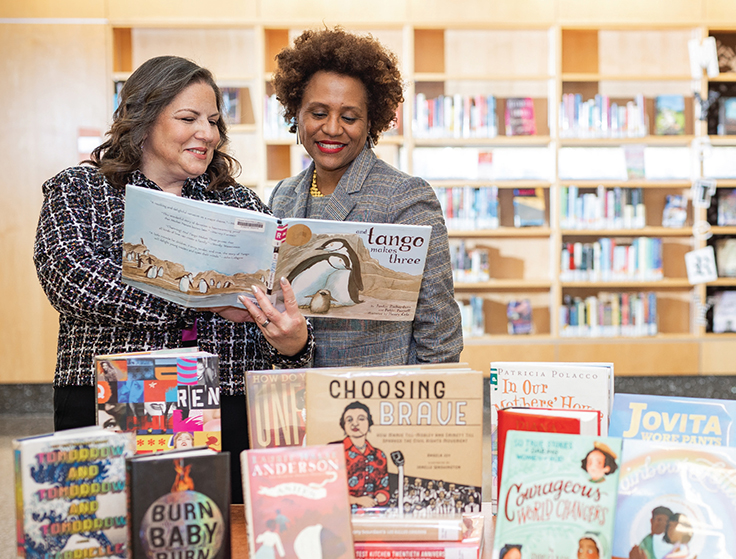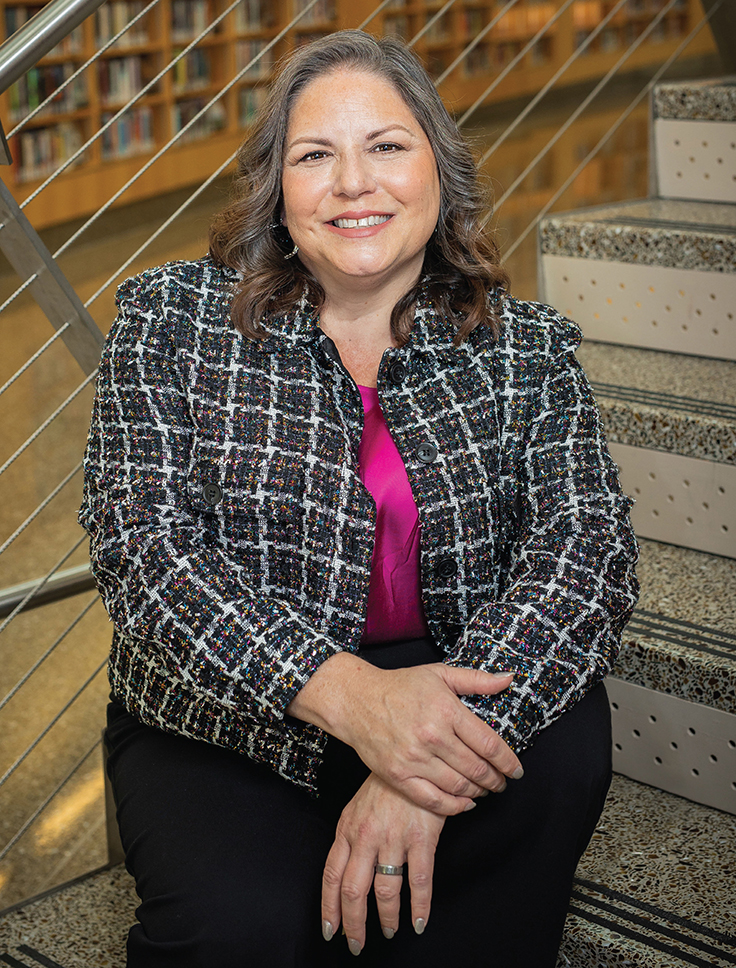Speaking Up: Lisa Varga Is LJ’s 2024 Librarian of the Year
Virginia Library Association Executive Director Lisa Varga battles censorship attempts with a combination of hard facts and heart.
 |
Photo by Misty Prewitt, Misty Saves the Day |
Virginia Library Association Executive Director Lisa Varga battles censorship attempts with a combination of hard facts and heart
Libraries in the Commonwealth of Virginia are fortunate to have the Virginia Library Association (VLA) on their side. Among other services, VLA provides continuing education to members through meetings, workshops, and two annual conferences; maintains the VLA Jobline and listserv; publishes the Virginia Libraries journal; sponsors several awards and scholarships; advocates for state and local funding; and supports libraries and individuals confronting intellectual freedom challenges.
Take a closer look, however, and you’ll see that those wheels are kept turning by one woman: VLA Executive Director Lisa Varga. She manages the association’s membership, committees, forums, elections, legislative process, and conferences from her home—and from her car, racking up more than 1,000 miles each month. She spoke publicly more than 40 times in 2023 alone.
Not only does she keep VLA running smoothly, but Varga’s active opposition to book challenges—testifying against censorship legislation, showing up to school board meetings, and empowering library advocates across the state to stand up to First Amendment threats through equal parts hard data and deep compassion—has made an enormous difference for libraries in Virginia and beyond.
“Over the last couple of years, many of us have felt like we were doing our best to keep our heads above water,” says Amanda Jackson, Virginia Public Library Directors’ Association president and director of Chesapeake Public Library. “Lisa Varga is a warrior. She has spent the last three years donning the armor of her intellect to fight for libraries not only in her back yard, but across the state of Virginia.”
There are many library advocates doing necessary and critical work right now; Varga’s unflagging generosity of spirit sets her apart. Because of her dedication to intellectual freedom, her conviction that the cause is always worth fighting for, and her support of fellow library defenders, Varga is LJ’s 2024 Librarian of the Year, sponsored by Baker & Taylor.
YOUTH SERVICES TO ASSOCIATION LEADERSHIP
Varga’s involvement with librarianship began with a love of research. She wanted to be a writer, but realized early on that she liked the process of inquiry and discovery more than the writing itself. Her uncle, a now-retired librarian at Skokie Public Library, IL, suggested she think about library school. When Varga read the course descriptions, she recalls, “I thought, oh my gosh—there are people like me that care about these things. I had no idea.”
She earned her MLIS from Rutgers University, NJ, and discovered that she liked helping other people find what they needed. She took a position at a copyright and trademark intellectual property firm, where she learned about building platforms for research databases. When her husband’s military career brought the family to Virginia, Varga took a youth services position at the Central Rappahannock Regional Library in Fredericksburg and discovered that she enjoyed the community aspect of librarianship as much as the work.
Her director at the time, Donna Cote, was active with the VLA, and Varga began to volunteer. When her family had to move again, Cote suggested that she consider the leadership job at VLA—a virtual position well before remote work became the norm—and Varga was appointed executive director in 2011.
She jumped into the role, despite the significant learning curve involved. “I’d never done any association management. I didn’t know that was a different career,” she says. “I just learned on the job.” Having worked as a frontline librarian was a major asset, she notes, allowing her to see how libraries and their communities are intertwined. As she got to know the library systems across Virginia, she began to see how regional needs could have statewide solutions.
ONE-WOMAN SHOW
For the last dozen years Varga has run VLA out of her home while raising three sons, working with a seven-person Executive Committee that is elected annually. The various arms of the association, such as the Conference, Awards and Recognition, and Legislative committees; the LGBTQIA+ and Librarians of Color forums; the Library of Virginia Liaison; and the Virginia Association of School Librarians rely on the work of more than 150 volunteers.
Varga has stewarded the association well, restructuring memberships to create new categories and tiers, which quadrupled membership to more than 5,000 library workers statewide; nearly 60 percent of Virginia public and academic libraries now participate. She brought in an equity, diversity, and inclusion consultant to provide training for elected members of the VLA Executive Committee and all library leadership in the state. During the height of the pandemic, Varga coordinated with the Virginia Department of Health on distribution of at-home COVID test kits through public library systems.
“Lisa is the backbone of and cheerleader for quality library services in Virginia, providing support, professional development, and collaborative opportunities,” says Kimberly Knight, director of the Virginia Beach Public Library and VLA immediate past president.
 |
ADVOCATES AND FANS Lisa Varga and Kimberly Knight, Virginia Beach Public Library director and VLA immediate past president, enjoy a selection of challenged books at the Tidewater Community College/City of Virginia Beach’s Joint Use Library. Photo by Misty Prewitt, Misty Saves the Day |
THE POWER OF POLICY CORPS
When ALA announced in 2017 that it would be opening applications for its Policy Corps, an initiative to bring together practitioners from across the field and help them develop a deep expertise in public policy issues, Varga jumped at the chance. “I wanted to get more involved in how to advocate and how to empower librarians to advocate for themselves, and I thought the Policy Corps would be a great place to get that training,” she says. She earned a place in the first cohort, formed in 2018, “and it turned out to be phenomenal.”
In addition to in-depth knowledge gained, Varga notes, the Policy Corps provides a way for those doing advocacy work to connect and share ideas. “The Policy Corps allowed me to get a deeper understanding of the legislative cycle, not just from a national perspective, but also local,” she says. “And it allowed this group of people who were interested in policy and legislation, things like E-Rate and copyright law—all these things that are coming to a head—to brainstorm the best way to wrap our arms around it, and what we can do locally, statewide, and nationally together.”
One of the most important Policy Corps components, notes Varga, has been the media training offered to members. She has taken part in “fly-in” advocacy meetings during national legislative sessions, and provided interviews for the Associated Press, Timemagazine, the New York Times, the Washington Post, the Chicago Tribune, National Public Radio, and various local media outlets. Currently, she works with a division of the Policy Corps focused specifically on ALA’s Unite Against Book Bans initiative.
A $7 MILLION INVOICE
In 2022, Varga happened on a Facebook video that invited residents of a local community to celebrate a temporary restraining order against the writers, publishers, and distributors of Gender Queer by Maia Kobabe and A Court of Mist and Fury by Sarah J. Maas. She decided she needed to check out the event. “I sat in the back of this restaurant and listened to some really hateful language, transphobia and homophobia and racism, in a way that I hadn’t heard people speak about in person.” From the parking lot, she made calls to activate her Policy Corps network through ALA’s Office of Intellectual Freedom to let them know what was happening.
“We all need to be aware of this,” she told them, “It’s not going to stop in Virginia Beach.”
Varga went on to act as VLA’s representative on the amicus briefs filed in Virginia Beach Circuit Court in the obscenity case against the books, working with the National Council Against Censorship, the Media Coalition, the Comic Book Legal Defense Fund, various law firms, the Association of American Publishers, the ALA Office of Intellectual Freedom and Public Policy Office, the American Booksellers Association, and others to ensure the petitions were dismissed.
After that lawsuit was resolved, Varga says, she began to see more people showing up at school board meetings reading passages of books out of context, claiming that librarians and educators were grooming and indoctrinating children and teens. The challenges and vitriol soon jumped from K–12 to public libraries throughout the state. When the judge in the Virginia Beach case stated that the titles in question didn’t fall under the definitions of pornography or obscenity, challengers began using the phrase “sexually explicit,” which has no legal definition. Would-be censors weren’t paying attention to the books’ content—a Freedom of Information Act (FOIA) request revealed that, of 16 reconsiderations filed in a couple of months, the challengers admitted that they had not read 14 of the titles in their entirety. Rather, they were cutting and pasting language from other reconsideration requests across the country.
Varga also noticed that nearly every person who got up to speak at board meetings started with: “My name is ________, and I’m a taxpayer.”
“And I thought, my name is Lisa, and I’m a taxpayer, and I don’t want you wasting my time on this,” says Varga. “You’re making people become terrible stewards of tax dollars by having to spend time explaining to you how the First Amendment operates and that none of the books in a library are pornographic or obscene no matter how many times you say it. That really motivated me to speak up on behalf of librarians and educators who were much more vulnerable than I was.”
Varga showed up at a school board meeting with an invoice for $7 million, representing the time that one member’s challenges had wasted, and told the board that she planned to take the bill to city council and ask them to add that money into the school budget. “If you stop to think about how many people have to get involved when a reconsideration is filed, and how that takes them away from the other work they need to be doing, you can really see how it’s meant to paralyze library services more than it’s meant to stop books from getting in the hands of people,” she says. “It’s meant to cause confusion and chaos.”
To help combat that chaos, Varga used her role to amplify the VLA Book Résumé Project spearheaded by volunteers Easter DiGangi and Melinda McKenzie. Borrowing an idea from New Jersey librarian Martha Hickson, the project involves a collaborative, sharable database for commonly challenged books. Each “résumé” includes quotes from reviews, awards, lists that have included the title in question, links to responses to challenges, and a reference list in APA style, serving as a resource that librarians can take to supervisors or principals to help explain why a title belongs on their shelves.
 |
Photo by Misty Prewitt, Misty Saves the Day |
LEGISLATIVE “WONDER WOMAN”
VLA’s One Click Politics Center, which allows members to sign up as advocates, has resulted in thousands of emails to elected officials, letting them know where their constituents stand on harmful legislation. A wallet card with a QR code linking to the form can be passed around at board meetings, bookstores, events, and gatherings. But Varga’s singular opposition to bills that would limit readers’ access has significantly moved the needle for libraries across the state—as well as providing a template for others to see how it can be done. “While she’s always been passionate about the freedom to read and First Amendment rights, this year Lisa Varga has been the Wonder Woman of libraries,” says Knight.
In the first eight months of 2023, the state saw challenges to 356 unique book titles—nearly double those challenged in 2022, according to ALA. “While Virginia is number two in the country regarding the number of challenged materials, things would be a lot worse without Lisa’s efforts,” says Augusta County Director Jennifer Scott Brown. “We are incredibly fortunate to have somebody like her fighting the good fight on behalf of libraries everywhere.”
In 2022, two bills affecting intellectual freedom in public schools were introduced in the Virginia General Assembly. SB275 and HB1032 called for local school boards to solicit parental involvement in public school libraries’ selection and evaluation of printed and audiovisual materials, and to require parental consent for students to check out titles “that could be considered grooming video or materials.”
Varga created a coalition to oppose the legislation, coordinating with the Virginia Association of School Librarians, the Virginia Public Library Directors’ Association, ALA’s Office of Intellectual Freedom, and the ALA Public Policy Office, as well as communicating with leaders from the Virginia Education Association, the Virginia School Boards Association, and the Virginia Association of School Superintendents.
In the 2023 General Assembly session, she addressed and defeated another 11 bills “written by people who don’t understand collection development, by people who don’t understand the First Amendment, and who just want to make their viewpoints the main viewpoint for everyone in Virginia,” says Varga.
FINDING VOICES
Those bills failed not only because librarians spoke up, Varga notes, but because the coalitions built over the years added their voices as well. Finding community partners and forming chains of communication is critical, she adds, and she’s been doing that work all along. “It’s one of those ‘other duties as assigned,’” she says. “No one ever said to me, ‘Go partner with these people.’ It was just me thinking, Okay, who else is out there that can fight for us?” They meet in courthouse lobbies after hearings, outside the rooms where school board meetings are held, and through Facebook groups.
Encouraging others to find their voices is an ongoing part of her mission. “People, when it comes to advocacy, really worry a lot: ‘I don’t want to step up and speak because I don’t want to say the wrong thing,’” she points out—particularly library workers, who like to have all the facts in place first. “Coaching people through that has become very important to me.”
Varga was shy as a child, she says—although “my mother will tell you that I was always rooting for the underdog”—and didn’t begin speaking up until she was older. “I’m thankful for the people who came before me, who helped to teach me how not to be afraid to say these things and to be confident in what I’m saying,” she says, and she works diligently to pay that forward.
This concept, of helping lift every voice to form a unified chorus of First Amendment defenders, makes Varga’s work both strong and sustainable. Her approach is personal because the assault on intellectual freedom so often becomes personal—“It’s meant to try to throw you off your game. It’s meant to make you question your intelligence, your confidence.”
She views her role as one reminding library allies that their voices count, and that the work—while difficult—is critical. “We don’t have to have a big splashy presence,” she says. “A lot of the assisting has been me being on the phone, texting, emailing, talking with people—mostly after hours, a lot of people after they’ve put their kids to bed—and sometimes just listening to them cry from exhaustion because they’re so tired, but they know that the work they’re doing is important. And they need someone who understands.”
Recently, the VLA Legislative Committee saw one of its most significant wins to date. After it asked for an increase of $2.2 million in FY24 state funding for libraries, the General Assembly instead approved an additional $3.6 million. “For us to be supported financially while fighting these bills sends a really clear message,” says Varga. “People making those decisions care about the value of their libraries, and they want us to succeed. So we’re going to do that.”
RELATED
ALREADY A SUBSCRIBER? LOG IN
We are currently offering this content for free. Sign up now to activate your personal profile, where you can save articles for future viewing









Add Comment :-
Comment Policy:
Comment should not be empty !!!